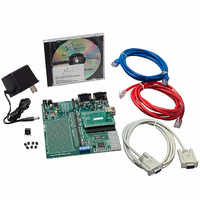NNDK-MOD5272-KIT NetBurner Inc, NNDK-MOD5272-KIT Datasheet - Page 292

NNDK-MOD5272-KIT
Manufacturer Part Number
NNDK-MOD5272-KIT
Description
KIT DEVELOP NETWORK FOR MOD5272
Manufacturer
NetBurner Inc
Series
ColdFire®r
Datasheets
1.MOD5272-100IR.pdf
(2 pages)
2.MOD5272-100IR.pdf
(550 pages)
3.NNDK-MOD5282-KIT.pdf
(2 pages)
Specifications of NNDK-MOD5272-KIT
Main Purpose
*
Embedded
*
Utilized Ic / Part
MOD5272
Primary Attributes
*
Secondary Attributes
*
Processor To Be Evaluated
MOD5272
Interface Type
RS-232, RS-485, USB
Lead Free Status / RoHS Status
Contains lead / RoHS non-compliant
Lead Free Status / RoHS Status
Lead free / RoHS Compliant, Contains lead / RoHS non-compliant
Other names
528-1001
- Current page: 292 of 550
- Download datasheet (6Mb)
Software Architecture and Application Notes
Isochronous packets are guaranteed to occur once per USB frame. The SOF and ASOF
interrupts are provided in order for the user to synchronize the data flow with the USB. The
SOF interrupt occurs every 1 ms provided the USB is active. The ASOF interrupt is
generated if the USB module fails to detect a SOF packet within the set timeout period.
It is strongly recommended that interrupts be used rather than polling for isochronous
endpoints as isochronous endpoints do not have any error detection or flow-control
mechanisms. If the packet size is larger than the FIFO size, using interrupts is required.
12.4.4.2.1 IN Endpoints
The user should write one packet of data to the IN FIFO per frame. If an ASOF interrupt
occurs, the user may wish to insert additional data in the data stream if the data for the frame
is lost. The following example demonstrates how to handle an isochronous IN packet each
frame with a packet size larger than the FIFO size:
12.4.4.2.2 OUT Endpoints
The user should read one packet of data from the OUT FIFO per frame. If an ASOF
interrupt occurs, the user may wish to discard the data for the frame. The following example
demonstrates how to handle an isochronous OUT packet each frame with a packet size
larger than the FIFO size:
12.4.5 Class- and Vendor-Specific Request Operation
The class- and vendor-specific requests are specific to a particular device class or vendor,
and are not processed by the USB request processor. When the USB module receives a class
or vendor request, the parameters for the request are written to the DRR1 and DRR2
12-32
1. Wait for the SOF interrupt for synchronization.
2. Write data to the FIFO until filled.
3. Wait for FIFO_LVL interrupt.
4. Read EPnDP to determine the number of bytes that can be written to the FIFO.
5. Write data to the FIFO to fill it or until all of the data for the packet has been written.
6. Repeat steps 3–5 until the entire packet has been written to the FIFO.
1. Wait for SOF interrupt for synchronization. The user may want to track that a packet
2. Wait for the FIFO_LVL interrupt.
3. Read EPDPn to determine number of bytes in the FIFO.
4. Read data the indicated number of bytes from the FIFO.
5. Repeat steps 2–4 until entire packet is received.
6. Wait for EOP or SOF interrupt and read any remaining data in the FIFO.
7. An EOT interrupt indicates a short or zero-length packet.
is received for every frame.
MCF5272 User’s Manual
MOTOROLA
Related parts for NNDK-MOD5272-KIT
Image
Part Number
Description
Manufacturer
Datasheet
Request
R

Part Number:
Description:
BOARD SERIAL-ETHERNET 512K FLASH
Manufacturer:
NetBurner Inc
Datasheet:

Part Number:
Description:
PROCESSOR MODULE FLASH MOD5272
Manufacturer:
NetBurner Inc
Datasheet:

Part Number:
Description:
PROCESSOR MODULE 512KB FLASH
Manufacturer:
NetBurner Inc
Datasheet:

Part Number:
Description:
DUAL PORT SERIAL-ETHERNET
Manufacturer:
NetBurner Inc
Datasheet:

Part Number:
Description:
PROCESSOR MODULE FLASH
Manufacturer:
NetBurner Inc
Datasheet:

Part Number:
Description:
PROCESSOR MODULE 512KB FLASH
Manufacturer:
NetBurner Inc
Datasheet:

Part Number:
Description:
MOD5234 10/100 ETHERNET MODULE
Manufacturer:
NetBurner Inc
Datasheet:

Part Number:
Description:
KIT DEVELOP NETWORK FOR MOD5282
Manufacturer:
NetBurner Inc
Datasheet:

Part Number:
Description:
DUAL PORT SERIAL-ETHERNET
Manufacturer:
NetBurner Inc
Datasheet:

Part Number:
Description:
Ethernet Modules & Development Tools 32 Bit 66MHz 40 Pin DIP Industrial Temp
Manufacturer:
NetBurner Inc
Datasheet:

Part Number:
Description:
Ethernet Modules & Development Tools MOD5213 DEVELOPMENT KIT
Manufacturer:
NetBurner Inc

Part Number:
Description:
Ethernet Modules & Development Tools DUAL PORT SERIAL EHTERNET DEVICE
Manufacturer:
NetBurner Inc
Datasheet:

Part Number:
Description:
Ethernet ICs 32bit 147MHz CAN-to- Ethnt Device IndTemp
Manufacturer:
NetBurner Inc
Datasheet:










